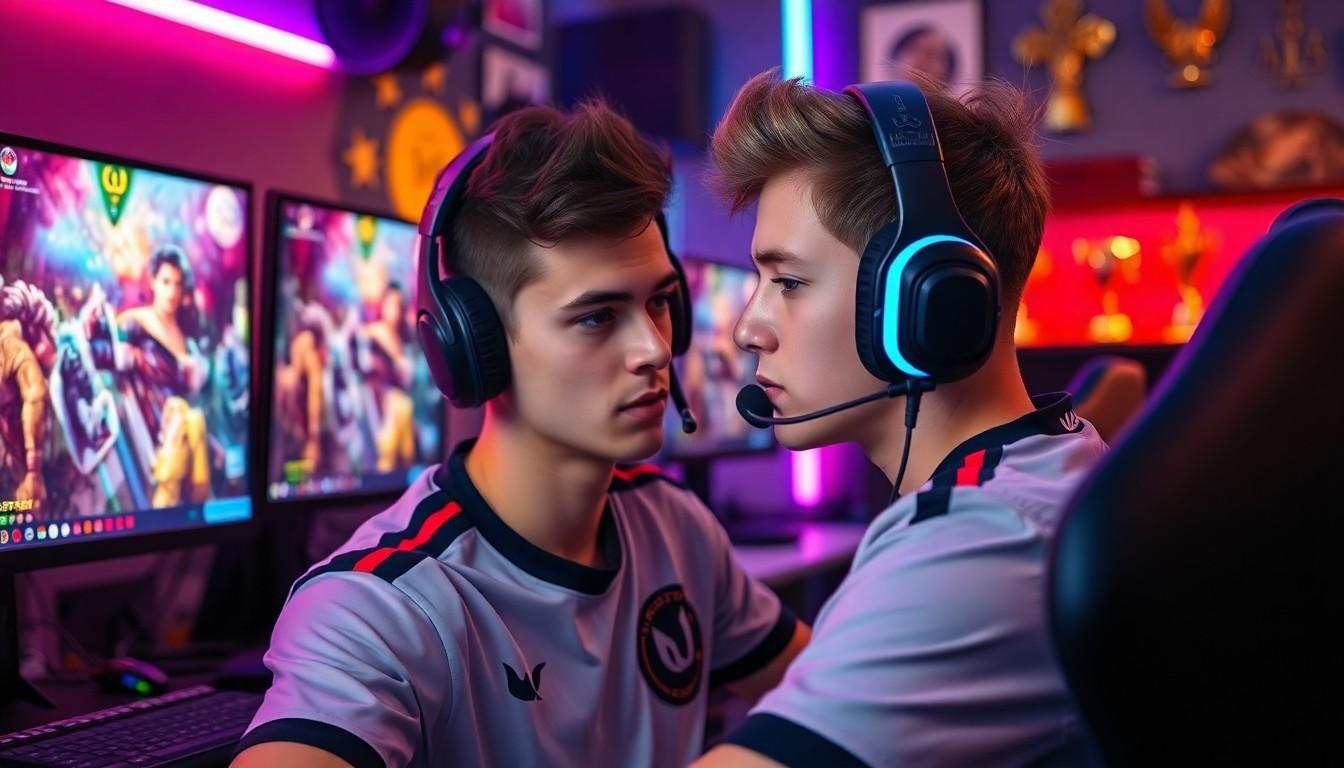In the fast-paced world of professional gaming, the choice of games is as crucial as a well-timed headshot. Gamers don’t just play for fun; they play to win, and the titles they choose can make or break their careers. So, what games are these digital gladiators diving into when they’re not busy perfecting their craft?
Overview of Professional Gaming
Professional gaming encompasses a diverse range of genres and titles. Many professional gamers compete in first-person shooters, strategy games, and multiplayer online battle arenas. Games such as “League of Legends,” “Dota 2,” and “Counter-Strike: Global Offensive” hold prominent positions in esports tournaments due to their competitive nature.
Gamers select titles based on various factors, including community support and prize pools. Larger communities often lead to increased opportunities for sponsorships and visibility. Popular titles like “Fortnite” and “Valorant” also draw significant attention, attracting both players and viewers.
Sustaining skill levels requires regular training and practice within chosen games. Professional gamers invest countless hours refining their strategies and teamwork, especially in team-based games. Understanding the metagame is crucial; it evolves frequently, requiring adaptability and constant learning.
Game developers play a key role in the esports ecosystem. Ongoing updates and balance changes can impact competitive play and shift community dynamics. Companies like Riot Games and Valve actively engage with their audiences, fostering environments that encourage participation.
Tournament structures influence the landscape of professional gaming as well. Events like the International and the League of Legends World Championship draw huge audiences and showcase the best players in the world. The excitement of live competitions fuels interest and engagement in the gaming community.
Ultimately, professional gamers choose their titles carefully. Prioritizing their impact on career growth and competitive viability ensures success in a fast-paced industry. The intersection of skill, community, and strategy defines the experience of professional gaming.
Popular Genres in Professional Gaming

Professional gamers engage with various game genres, each contributing to their competitive success and appeal in the esports industry.
First-Person Shooters
First-person shooters rank among the top genres in professional gaming. Titles like “Counter-Strike: Global Offensive” and “Valorant” excel in competitive play, emphasizing skill and quick reflexes. These games require precise aiming, teamwork, and strategic planning. Competitive tournaments often feature immense prize pools, drawing top talent globally. Players spend excessive hours mastering maps and weapon characteristics, ensuring peak performance during matches. Community engagement further enhances the popularity of these titles, leading to extensive outreach and sponsorship opportunities.
Multiplayer Online Battle Arenas
Multiplayer online battle arenas (MOBAs) dominate the esports landscape. Games such as “League of Legends” and “Dota 2” showcase team-based gameplay that revolves around strategy and cooperation. Players select unique characters, or champions, each with specialized abilities, making teamwork vital for success. Esports events like the International and World Championship attract significant viewership and sponsorship. Time invested in learning game mechanics, hero matchups, and team dynamics positions players for victory. These factors create a thriving ecosystem that supports professional gamers in their careers.
Real-Time Strategy Games
Real-time strategy (RTS) games feature intricate gameplay centered on resource management and tactical decision-making. Titles like “StarCraft II” highlight the depth and complexity of competitive strategy gaming. Players compete by building armies, managing economies, and outmaneuvering opponents in fast-paced matches. The skill set required for RTS games often includes quick thinking and adaptability to changing circumstances. Major tournaments draw large audiences, emphasizing the genre’s significance in the esports community. Players continuously analyze strategies and refine techniques to maintain an edge over competitors.
Key Games Played by Gamrawresports Professionals
Professional gamers engage with various titles that define their careers. The following games highlight their skills and competitive strategies.
Game 1: League of Legends Insights
League of Legends commands a massive player base and features intense team dynamics. This multiplayer online battle arena (MOBA) requires strategic planning and quick reflexes. Professional players master champions and adapt to ongoing meta changes, honing their skills in every match. Tournament circuits like the League of Legends World Championship showcase top-tier talent and lucrative prize pools. Gamrawresports professionals thrive in this environment, focusing on synergy and communication to outplay opponents.
Game 2: Counter-Strike: Global Offensive Insights
Counter-Strike: Global Offensive remains a cornerstone of the esports community, highlighting precision shooting and teamwork. Players specialize in specific roles, enhancing their team strategy and effectiveness. The competitive scene is robust, featuring noteworthy events like ESL and Blast Premier. Gamrawresports athletes emphasize map knowledge and weapon mastery to secure victory. The game’s emphasis on tactics and individual skill makes it a popular choice among professional gamers.
Game 3: Dota 2 Insights
Dota 2 stands out for its strategic depth and diverse character pool. Each match demands collaboration and quick decision-making from team members. Gamrawresports professionals invest countless hours analyzing gameplay and refining strategies. The International features exceptionally high prize pools, attracting skilled players globally. In this challenging environment, teamwork and creativity are crucial for success, making Dota 2 an essential title in the esports realm.
The Impact of Game Selection on Competitive Success
Game selection plays a crucial role in the success of professional gamers. Competitive titles attract gamers due to their complexity, requiring a combination of strategy, skill, and teamwork. Specific games such as “League of Legends,” “Dota 2,” and “Counter-Strike: Global Offensive” dominate the esports landscape, reflecting a commitment to excellence among players.
Games with large communities often provide more visibility and sponsorship opportunities. Players thrive in environments where they can engage with a supportive fanbase and collaborate with others. A title’s competitive scene shapes the career trajectories of professional gamers, ensuring they focus on games that facilitate growth.
Skill enhancement becomes a priority in selected games. Team-based titles demand communication and adaptability, pushing players to refine their strategies continually. Additionally, ongoing updates from developers ensure that the metagame remains dynamic, compelling players to stay informed and versatile.
Tournament structures further influence game selection. Events like the International and the League of Legends World Championship highlight the importance of specific games and can boost a player’s career. Successful participation in these high-stakes competitions elevates a gamer’s profile and marketability as a professional.
Genre characteristics significantly affect competitive success. First-person shooters emphasize precision and quick decision-making, while MOBAs require acute strategic planning and cooperative play. Each genre’s unique demands contribute to the overall appeal of professional gaming, where selecting the right game is integral to achieving competitive excellence.
Conclusion
Game selection plays a pivotal role in the success of professional gamers. The titles they choose not only shape their competitive journey but also influence their visibility and sponsorship opportunities. With the gaming landscape constantly evolving, staying adaptable and informed is essential for maintaining a competitive edge.
As gamers navigate through various genres like first-person shooters and MOBAs, their dedication to skill refinement and teamwork becomes evident. The ongoing updates from developers ensure that the metagame remains dynamic, further emphasizing the importance of strategic game choices. Ultimately, selecting the right games is crucial for those aspiring to excel in the competitive realm of esports.

